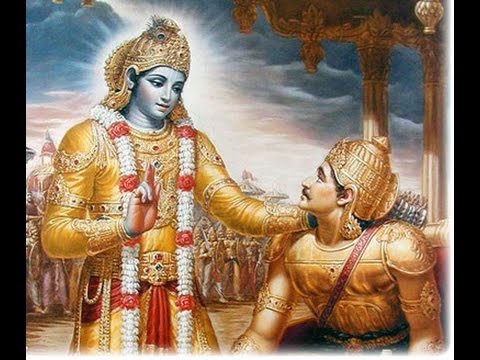1
Bhagawad Gita

2
Bhagwad Gita is part of Bhishma Parva
of the epic Mahabharata.
It is a dialogue between the Pandava prince Arjuna
and his guide and charioteer Lord Krishna.
The dialogue is initiated by the Lord after Arjuna
drops his bow and refuses to fight in the battle.
3
The Lord instructs Arjuna regarding the duties
of a man, the nature of the soul,
the various aspects of yogic life and the various paths
towards the Supreme Godhead.
It consists of 700 verses in 18 chapters
4
Lord Krishna says to Arjuna in Chapter 4 verse 1 ,
This is not the first time this
knowledge is being given to mankind.
In tretha yug, he had instructed this
imperishable science of yoga to the sun-god, Vivasvän,
and Vivasvän instructed it to Manu, the father of mankind,
and Manu in turn instructed it to Maharaj Ikñväku.
5
A synthesis of knowledge, devotion, and desire less action
is given as the righteous path to tread for Arjuna;
The same combination is suggested as a way to moksha.
Bhagavad Gita refers to yoga as the union
with the ultimate reality or the Absolute.
6
Though every chapter is named as a yoga in Bhagwad Gita,
a more broader classification is as follows:
Chapters 1–6 = Karma yoga, the means to the final goal
Chapters 7–12 = Bhakti yoga or devotion
Chapters 13–18 = Gyaana yoga or knowledge, the goal itself
7
The most Important slokas are:
1) Chapter 2 ( Sankhya yoga) verse 47
To action alone a man has a right
and never at all to its fruits;
Let not the fruits of action be the motive;
neither let there be any attachment to inaction
8
2) Chapter 2 ( Sankhya yoga) verse 48
Fixed in yoga, do the work, O Winner of wealth (Arjuna),
abandoning attachment, with an even mind in success and failure,
For evenness of mind is called yoga.
9
3) Chapter 5 (Karma–Sanyasa yoga ) Verse 11
The yogīs, abandoning attachment, act with body, mind, intelligence,
and the senses, only for the purpose of purification.
10
4) Chapter 2 (Sankhya yoga) Verse 62
When a man dwells in his mind on the sense object,
attachment to them is produced.
From attachment springs desire and from desire comes anger.
11
5) Chapter 2 (Sankhya yoga) Verse 63
From anger arises bewilderment, from bewilderment loss of memory;
and from loss of memory, the destruction of intelligence and
from the destruction of intelligence he perishes.
12
6) Chapter 2 (Sankhya yoga) Verse 3
Swami Vivekananda states this sloka as the one,
which captures the essence of Gita
Do not yield to unmanliness, O Partha, for it does not befit you.
Shake off this petty faintheartedness and arise, O scorcher of enemies!
13
Summary of all the chapters:
Chapter 1 - Observing the armies
on the battlefield of Kurukshetra
Prathama adhyaya - 46 verses
Chapter 2 - Contents of Gita summarized
Sankhya yoga - 72 verses
Chapter 3 - Karma yoga 43 verses
14
Chapter 4 - Transcendental knowledge
Gyaana–Karma-Sanyasa yoga- 42 verses
Chapter 5 - Karma–Sanyasa yoga 29 verses
Chapter 6 - Dhyana yoga or Atmasanyam yoga 47 verses
Chapter 7 - Knowledge of the absolute
Gyaana–ViGyaana yoga 30 verses
15
Chapter 8 - Attaining the supreme
Aksara–Brahma yoga 28 verses
Chapter 9 - The most confidential knowledge
Raja–Vidya–Raja–Guhya yoga 34 verses
Chapter 10 - The Opulence of the absolute
Vibhuti–Vistara–yoga 42 verses
Chapter 11 - The universal form
Visvarupa–Darsana yoga 55 verses
16
Chapter 12 - Devotional service
Bhakti yoga - 20 verses
Chapter 13 - Nature, the enjoyer and consciousness
Ksetra–Ksetrajna Vibhaga yoga 35 verses
Chapter 14 - The three modes of material nature
Gunatraya–Vibhaga yoga 27 verses
17
Chapter 15 - Yoga of the supreme person
Purusottama yoga 20 verses
Chapter 16 - The divine and demoniac natures
Daivasura–Sampad–Vibhaga yoga 24 verses
Chapter 17 - The divisions of faith
Sraddhatraya-Vibhaga yoga 28 verses
Chapter 18 - Conclusion - The perfection of renunciation
Moksha–Sanyasa yoga 78 verses
18
To summarise the messages in these chapters:
Lord krishna advocates knowledge, devotion, and desireless action
as the paths that lead to him.
Anyone who pursues this path steadfastly is sure to reach him.
Let Krishna always guide us.
Hare Krishna!

